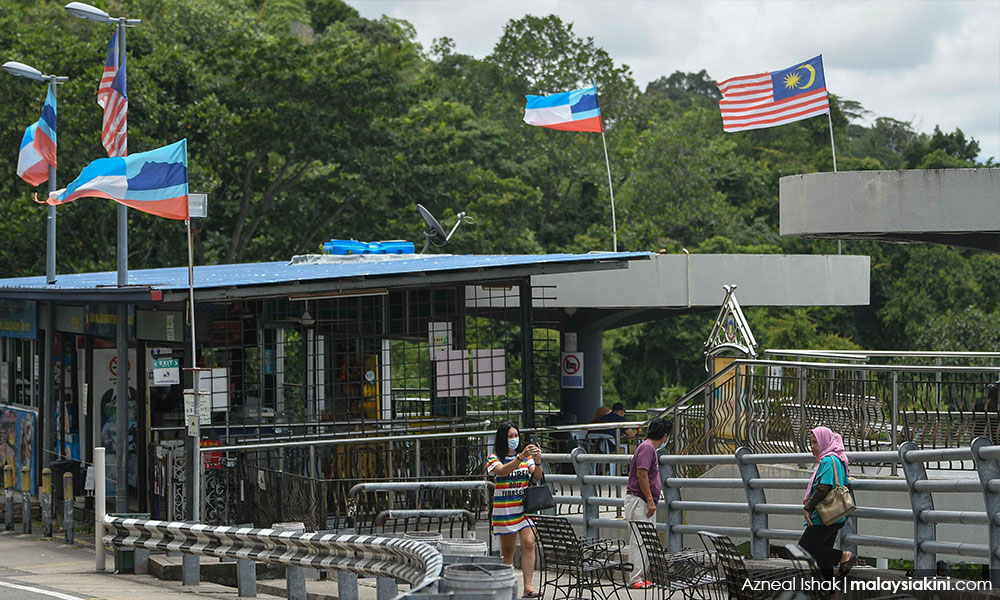COMMENT | This is a court action brought by the Sabah Law Society (SLS) against the federal government on June 9, 2022. The court action is called a judicial review.
A judicial review is normally used where a public authority’s use of its power prescribed under the law is alleged to be an abuse of power or unlawful. In the judicial review, the High Court has extensive powers to determine that it is an abuse of power and remedy it. The Sabah government applied to be joined as another respondent in the judicial review.
Here, the case title is Application for Judicial Review No BKI-25-14/6-2022 between SLS as the applicant on the one part, the federal government of Malaysia as the first respondent and the state government of Sabah as the second respondent on the other part.
What is the case about?
The federal government was under “a constitutional duty” to pay a special grant annually to Sabah in accordance with provisions in the Federal Constitution. The constitutional duty is contained in Article 112C and Section 2 of Part IV in the Tenth Schedule.
The special grant for Sabah is expressed in Section 2 of Part IV in the Tenth Schedule of the Federal Constitution as “an amount equal in each year to two-fifths of the amount which the net revenue derived by the federation from Sabah exceeds the net revenue which would have been so derived in the year 1963”.
Net revenue means “the revenue which accrues to the federation, less the amounts received by the state in respects of assignments of that revenue”.
The special grant, being two-fifths of the amount, is commonly referred to as Sabah’s 40 percent entitlement.
Sabah’s 40 percent entitlement was due to be paid immediately after the formation of the federation of Malaysia on Sept 16, 1963. The 40 percent entitlement was one of the rights granted to Sabah as promised under the Malaysia Agreement 1963 (MA63). This right, amongst others, was contained in the Report of the Inter-Governmental Committee dated Feb 27, 1963, in paragraphs 24(6), (8) and (9).
In MA63 at Article II, the government of the federation of Malaya promised that the Malaysia Act would be enacted by the Malayan Parliament to come into force on Malaysia Day. The financial provisions, including the duty to pay the 40 percent entitlement, were contained in Malaysia Act and these were enacted as amendments to the Federal Constitution.
The 40 percent entitlement was therefore expressly stipulated as a constitutional duty to be performed post-formation of Malaysia under Article 112C and Section 2 in Part IV of the Tenth Schedule of the Federal Constitution. This was a condition for the people of Sabah (then North Borneo) to agree to join Malaya, Sarawak, and Singapore to form the Federation of Malaysia.
The 40 percent entitlement was an important part of the financial provisions to provide for the development needs of Sabah. It was commonly acknowledged that Sabah and Sarawak were economically behind Malaya when Malaysia was formed.
The duty to pay Sabah’s 40 percent entitlement is subject to the duty to review such payments as prescribed under Article 112D of the Federal Constitution. Clause (1) of that article provides for the federal government and the Sabah government at a review to agree to a grant other than the 40 percent entitlement if the two governments were to agree to such a modification of the right for such period as agreed between them.
Clause (4) of Article 112D says that the first review should not be too early but also shall not be held later than 1969. Then the second review shall be held no later than 1974.

On April 14, 2022, the federal and Sabah governments announced in the news that they had agreed to payment of annual grants for a period of five years, 2022 to 2026, but that negotiations were continuing on Sabah’s 40 percent entitlement.
However, on April 20, 2022, the federal government published its decision under a federal government-gazetted order “The Federal Constitution [Review of a special grant under Article 112D] [State of Sabah] Order 2022” (the Review Order 2022). The main part of the Review Order 2022 states as follows:
“For a period of five years with effect from Jan 1, 2022, the government of the federation shall make to the state of Sabah, in respect of the financial year 2022, 2023, 2024, 2025 and 2026 grants in the sum of RM125.6 million, RM129.7 million, RM133.8 million, RM138.1 million and RM142.6 million respectively.
“The Sabah Special Grant (First Review) Order 1970 [PU (A) 328/1970 is revoked.”
SLS says that this was a serious breach of the federal and state governments’ constitutional duty to the people of Sabah mandated under those provisions noted above in the Federal Constitution.
This breach gives rise to legal consequences. Ultimately, the people of Sabah suffer the consequences. The wrong, which SLS will prove in the case, is perpetuated against the people of Sabah. They are the ones who have been deprived of the payment of the 40 percent entitlement from 1974 to 2021: 48 years. These are the lost years.
Why is SLS taking up the case?
Much is in the news in 2021 and 2022 that Sabah is entitled to the 40 percent entitlement. What is it exactly? No one seems to specify it clearly. Politicians in government and in the opposition have said in strong terms that the 40 percent must be paid to Sabah by the federal government.
However, when the Review Order 2022 was published in the government gazette, SLS was alarmed to read that there was no admission of the failure to hold the Article 112D review by 1974 and thus payment of the 40 percent entitlement for the lost years.
SLS says this was in contravention of the constitutional public duties of both the federal and state governments. There was plainly no redress for the failure to pay the 40 percent entitlement for the lost years. No 40 percent entitlement was paid for 48 years to Sabah.
In any judicial review of the public authority’s statutory powers, there is a time limitation period of three months from the decision. SLS had to act expeditiously and commence the judicial review before the time limit expires.
SLS is an independent body of advocates who reside permanently in Sabah. It is also non-political. Its highly held object is “to uphold the cause of justice without regard to its own interests or that of its members, uninfluenced by fear or favour”. SLS is also to assist the public in all matters relating to the law.

SLS, being a Sabah body of advocates, together with all people of Sabah would obviously be aggrieved and adversely affected by the Review Order 2022 were the grievances emphasised above not be redressed by the Court. SLS views this as a public wrong for which all the people in Sabah suffer. This judicial review is thus public interest litigation.
How are the people in Sabah affected?
The 40 percent entitlement is special to Sabah. No other states in Malaysia have been promised this grant. It was intended for the development of Sabah. Especially the basic infrastructure such as proper roads connecting all parts of Sabah, clean and adequate water supply and uninterrupted power supply every Sabahan household and business has a right to expect, and so on.
After close to 60 years since the formation of Malaysia, Sabah still does not possess the basic infrastructure and amenities. Meanwhile, Sabah being a major contributor of its rich oil resources to the development of Malaysia’s petroleum industry through Petronas (wholly owned by the federal government) that have benefitted the development of peninsular Malaysia, lags behind. Eight of the 10 poorest districts in Malaysia identified in the 12th Malaysia Plan are in Sabah.
Many think the federal government’s failure to honour the payment of the Sabah’s 40 percent entitlement is one of the reasons why Sabahans are adversely and detrimentally affected.
How can Sabahans participate in this case?
On Nov 11, 2022, SLS was granted permission by the Kota Kinabalu High Court to proceed with the substantial hearing of the judicial review. That hearing would have by now taken place were it not for the federal attorney-general’s appeal against the decision to grant permission.
This appeal is now scheduled to be heard in the Court of Appeal sitting in Kota Kinabalu on Sept 14, 2023, two days before the 60th Malaysia Day.
SLS has been keeping the public informed of this court action each step of the way. However, since it is such an important case in which every Sabahan has an interest and whose outcome would affect every Sabahan, SLS is taking this further step to explain directly what this case is about to the public so that Sabahans have a better appreciation of the importance of the case.
At the Court of Appeal hearing at the Kota Kinabalu Court Complex on Sept 14, 2023 at 9am, this hearing is fully open to the public. SLS would encourage any member of the public to attend and follow the proceedings at the hearing.
If SLS succeeds in resisting the federal attorney-general’s appeal against permission to proceed, then the most likely next hearing would be the substantial hearing of the judicial review before the High Court in Kota Kinabalu.
Apart from participating directly in attending the hearing, each Sabahan can also participate by informing their family, friends and colleagues about this court action. For this case is every Sabahan’s case.
After reading this summary, if any of you or your organisation thinks that you need a further explanation of the case and legal proceedings, you are free to contact SLS’ personnel Valarie Claudius during office hours Monday to Friday at this telephone number 088-232662. Depending on the need and response, SLS would plan and act accordingly.
ROGER CHIN is president of the Sabah Law Society.
The views expressed here are those of the author/contributor and do not necessarily represent the views of Malaysiakini.

